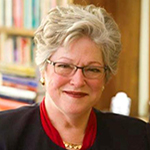By Molly T. Marshall
 This time of year is a “come to Jesus” season for many of us as we assess our need for better health, which usually includes weight loss for the more sedentary among us. We weigh hopes of illusive silhouettes against inscribed habits and gain data about the disparities. Which is not enough.
This time of year is a “come to Jesus” season for many of us as we assess our need for better health, which usually includes weight loss for the more sedentary among us. We weigh hopes of illusive silhouettes against inscribed habits and gain data about the disparities. Which is not enough.
I recently met with a pastoral friend to commiserate about such concerns. Forced to early retirement because of chronic back pain, he has found a way to include consistent exercise in his daily regimen. I asked him to pray for me in this. He responded by saying, “Only you can be the answer to this prayer.” I wanted more empathy in the struggle to lose weight, but his perceptive interpretation calls me to new resolve.
Another form of gaining and losing is on my mind these days as I consider how Baptists can devote more intellectual rigor to clarifying our theological and missional posture. I am concerned that over the years, some of our tribe has been more focused on articulating what we are against rather than what we are for. Which is not enough.
It is important, of course, to not believe some things are an affront to conscience and reason. For example, to believe in a “young earth” in order to support a literalistic reading of Scripture is sheer nonsense in the face of credible scientific research. We gain insight as we read the Book of Nature alongside the Book of Scripture.
Losing the patriarchal bias when reading Scripture or ordering ecclesial life is, in my judgment, a gain for hermeneutics and congregational practice. Over the past 40 years I have seen a remarkable shifting of the horizon for women in ministry. Barriers yet remain, but many Baptists have made it a defining conviction; they believe God is calling women as well as men to be pastoral leaders. Which is not enough.
Belief matters — inescapably so. Part of the challenge in many congregations or schools that fashion themselves as “progressive” is that we fail to convey with clarity our understanding of the creative and redemptive work of God, the desperate human condition that requires such divine agency, and the critical role of the church as instrument of grace in the world. What then is the gospel we are proclaiming? Too often it is theology lite, with its self-help affirmations, buttressing our insularity with divine comfort in a world rife with war, persecution and economic genocide. Which is not enough.
Belief invites conversations that matter. Contemporary data about church participation and enrollment in seminaries are teaching us that persons are not interested in a diffuse sense of identity or a less than compelling mission. If nothing is really at stake, why bother? If we have only a utilitarian view of God — one who is at our disposal for self-enrichment — we have not understood how treacherous our sinful lives are without a Redeemer. Which is not enough.
Theological heft requires cogent belief accompanied by incarnational ministry. Actions that demonstrate theological conviction are even more significant than confessional verities, for they exegete intellectual assent through praxis. Most people act their way into belief, anyway. Through patient and formative practices of mercy, service and justice, we learn that “our life and our death is with our neighbor,” as Abba Anthony observed, and the community of broken people becomes our teacher about our need of God and one another.
Gaining and losing are a part of the paschal rhythms of life; dying and rising shape the contours of faith and mark our progression into God’s dream for this beloved creation. Some things have to die — a false sense of self, a xenophobic grasp for identity, a disregard for the fragile and threatened creation — in order for God’s reign to be realized.
The process of stripping away corrupting accretions to Christianity, a grievous loss for some, is necessary, and it allows us to determine what should remain at the heart of faith and practice. Every season of renewal in the church involves winnowing indispensable wheat from inconsequential chaff. Without the discerning guidance of the Holy Spirit, we could not both conserve and innovate.
It is time we seek greater depth in understanding the mission of the Triune God, who reaches toward the world as Son and Spirit, and thereby is making all things new. Playing our roles in God’s drama will grant us our greatest dignity, for we are destined for redemption.
Our lives in faith depend upon a continual sifting of our imbedded theology and the intentional movement toward deliberative theology. Gaining theological heft requires the responsiveness of the inherited faith to the urgent interrogation of the present generations. Out of this interface of heritage with contemporary insight, a fresh theological vision will come, one weighty enough to invite full-bodied participation.
